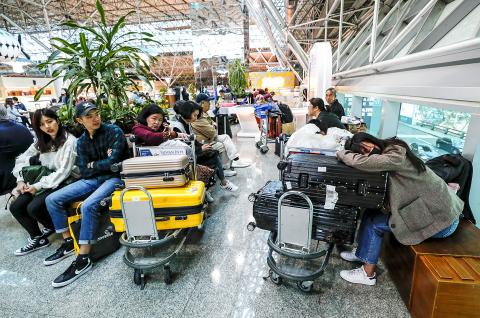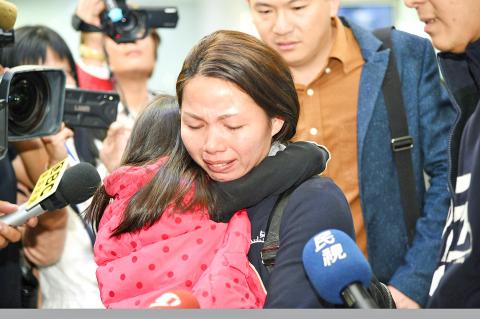Thousands of travelers faced major disruptions after a pilots’ union announced a strike against China Airlines Ltd (CAL, 中華航空) yesterday morning — the first staged during a Lunar New Year holiday.
Shortly after midnight yesterday, the Taoyuan Union of Pilots said that China Airlines pilots who are union members would go on strike from 6am.
The airline, passengers and officials were taken by surprise, as many thought the union would not go on strike, because it is a peak travel period and tens of thousands of people had booked flights going abroad or returning to Taiwan.

Photo: EPA-EFE
As of noon yesterday, the Ministry of Transportation and Communications said that the strike had affected 3,184 passengers.
China Airlines is one of the nation’s largest carriers, and the strike had an immediate effect on Taiwan Taoyuan International Airport, Kaohsiung International Airport and Taipei International Airport (Songshan airport).
Union officials held a news conference at Songshan airport in the morning, where union board director Chen Pei-pei (陳蓓蓓) said the group has not set a schedule, and if the company does not address pilots’ grievances, they would go on strike indefinitely.

Photo by Chang Chung-yi, Taipei Times
The union has collected more than 200 flying certificates from member pilots, which means that they agree to the strike and have voluntarily given up their rights to operate an aircraft, she said.
“Many pilots are on vacation right now, but they will soon return home and will hand in their credentials. So the number will continue to grow. We have also received numerous calls from members expressing their support for the strike,” Chen said.
This would affect more China Airlines flights in the coming days, she said, adding that the union represents about 900, or 80 percent, of the carrier’s pilots.
Union members said that the issue of overwork was their main grievance.
“We are asking the company to remove factors that cause pilots fatigue and threaten flight safety,” union chairwoman Lee Hsin-yen (李信燕) said.
Specifically, China Airlines should assign four pilots and copilots instead of the usual three to all flights of more than 12 hours, while flights of eight hours or more should have three crew members instead of two, Lee said.
However, the airline has refused, saying that the proposed move would significantly increase the company’s operational costs and reduce its competitiveness, Lee said.
Pilots said that they have been demanding better pay, more rest hours and greater autonomy for nearly a year.
China Airlines also held a news conference, saying that the strike affected 18 flights, or 10 percent of its transport capacity.
It urged passengers not to panic, saying it would work with other airlines to send them to their destinations.
The airline said in a statement that it has never stopped negotiating with pilots and that union officials were misleading the public, because many of the demands they made in public were different from what they had told the company.
China Airlines chairman Ho Nuan-hsuan (何煖軒) traveled to Taiwan Taoyuan International Airport at 10am, where he thanked ground staff for doing their job and maintaining standards.
“I had asked union representatives to sit down and negotiate together, but they were not willing to do so... I still look for such a face-to-face meeting to find common ground,” Ho said.
“The pilots’ union had raised their demands, which we cannot resolve, because they involve legal issues. In a democratic country, everyone has to follow the law, and I cannot fix these legal issues by myself,” Ho said.
The China Airlines Employees Union, which represents the carrier’s workers, issued a statement urging passengers to remain rational and not direct their frustrations at ground staff, because they are not participating in the strike.

A Ministry of Foreign Affairs official yesterday said that a delegation that visited China for an APEC meeting did not receive any kind of treatment that downgraded Taiwan’s sovereignty. Department of International Organizations Director-General Jonathan Sun (孫儉元) said that he and a group of ministry officials visited Shenzhen, China, to attend the APEC Informal Senior Officials’ Meeting last month. The trip went “smoothly and safely” for all Taiwanese delegates, as the Chinese side arranged the trip in accordance with long-standing practices, Sun said at the ministry’s weekly briefing. The Taiwanese group did not encounter any political suppression, he said. Sun made the remarks when

The Taiwanese passport ranked 33rd in a global listing of passports by convenience this month, rising three places from last month’s ranking, but matching its position in January last year. The Henley Passport Index, an international ranking of passports by the number of designations its holder can travel to without a visa, showed that the Taiwan passport enables holders to travel to 139 countries and territories without a visa. Singapore’s passport was ranked the most powerful with visa-free access to 192 destinations out of 227, according to the index published on Tuesday by UK-based migration investment consultancy firm Henley and Partners. Japan’s and

BROAD AGREEMENT: The two are nearing a trade deal to reduce Taiwan’s tariff to 15% and a commitment for TSMC to build five more fabs, a ‘New York Times’ report said Taiwan and the US have reached a broad consensus on a trade deal, the Executive Yuan’s Office of Trade Negotiations said yesterday, after a report said that Washington is set to reduce Taiwan’s tariff rate to 15 percent. The New York Times on Monday reported that the two nations are nearing a trade deal to reduce Taiwan’s tariff rate to 15 percent and commit Taiwan Semiconductor Manufacturing Co (TSMC, 台積電) to building at least five more facilities in the US. “The agreement, which has been under negotiation for months, is being legally scrubbed and could be announced this month,” the paper said,

MIXED SOURCING: While Taiwan is expanding domestic production, it also sources munitions overseas, as some, like M855 rounds, are cheaper than locally made ones Taiwan and the US plan to jointly produce 155mm artillery shells, as the munition is in high demand due to the Ukraine-Russia war and should be useful in Taiwan’s self-defense, Armaments Bureau Director-General Lieutenant General Lin Wen-hsiang (林文祥) told lawmakers in Taipei yesterday. Lin was responding to questions about Taiwan’s partnership with allies in producing munitions at a meeting of the legislature’s Foreign Affairs and National Defense Committee. Given the intense demand for 155mm artillery shells in Ukraine’s defense against the Russian invasion, and in light of Taiwan’s own defensive needs, Taipei and Washington plan to jointly produce 155mm shells, said Lin,